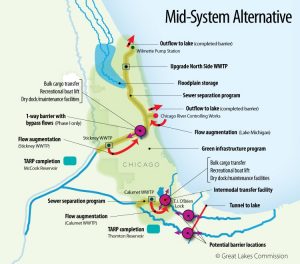PRESS RELEASE ISSUED: January 31, 2012
River, Lake Advocates Praise New Path Toward Better Flood Control, Cleaner Water, and Keeping Asian Carp Out of Great Lakes
A highly-anticipated report released today clearly demonstrates that it is possible to separate the artificial connection between the Great Lakes and the Mississippi River basins and prevent the transfer of invasive species through the Chicago river system.
The study, Restoring the Natural Divide, offers real alternatives to simply closing the locks between the Chicago River and Lake Michigan. Authored by the Great Lakes Commission and Great Lakes-St. Lawrence Cities Initiative, representing governors and top officials from Great Lakes states, cities, and provinces, the report re-envisions the Chicago River as a system which not only prevents the transfer of aquatic invaders such as Asian carp, but also better serves its functions of moving people and goods and managing stormwater, while improving water quality.
 Restoring the Natural Divide offers detailed analysis on three possible separation scenarios and includes a wealth of data on the integration of each scenario with the region’s water infrastructure, as well as an outline and timetable for implementation.
Restoring the Natural Divide offers detailed analysis on three possible separation scenarios and includes a wealth of data on the integration of each scenario with the region’s water infrastructure, as well as an outline and timetable for implementation.
The study was prompted by the urgent need to find a solution to the the ongoing problem of invasive species, including Asian carp. Strong evidence suggests that the threat of Asian carp entering the Great Lakes is imminent and their potential to wreak ecological and economic havoc is real.
While Asian carp have been the public face of invasive species, they are among 39 species deemed “high risk” by the Army Corps of Engineers based on a propensity to invade and to inflict significant damage to new habitat.
Local and Federal Governments currently spend upwards of $200 million per year to control invasive species in the Great Lakes. Ending the continuing threat of transfer of these aquatic invaders through the Chicago River system will be essential to the region’s long-term economic well-being, and would complement plans for river restoration, increasing the value of Chicago’s second waterfront.
“Chicago and Illinois have been under a spotlight as the carp close in on Lake Michigan,” says Joel Brammeier, President and CEO of the Alliance for the Great Lakes. “This report shines that light in a new direction: toward the transformation of the Chicago waterway into a resource of which everyone in the city, the state and the country can be proud.”
Illinois conservation groups and NGOs thanked Governor Quinn and Mayor Emanuel for serving on the study’s Executive Committee and commended them for taking a leadership role in the process.
“This study is part of a greater effort and vision for river restoration,” says Robert Hirschfeld, Invasive Species Coalition Organizer for Prairie Rivers Network. “It makes the case for separation at a time when Illinois leaders are actively reinvesting in Chicago’s river, affirming its place as a vital asset to the people of Illinois.
Restoring the Natural Divide provides a detailed evaluation of a complex water system which serves many functions in the Chicago region. The study effectively demonstrates to the region’s leaders that separation can be accomplished while also satisfying public needs, and without severing Chicago’s vital connection to the lake.
What makes the study so constructive,” said Margaret Frisbie, executive director of Friends of the Chicago River, “is that it presents plausible solutions for separation away from the lakefront while protecting the ecology and economic health of the whole river system. These kinds of explorations make it possible to imagine an outcome that stops invasive species, addresses transportation issues, controls flooding, and above all else ensures a clean, healthy river on both sides of the barrier. Done well, everybody wins. Friends is going to protect the river no matter which way it flows, and through this process we will work to ensure that the river and its users are protected, too.”
Restoring the Natural Divide not only provides valuable information for stakeholders working to improve the Chicago River system, but could inform and expedite the Great Lakes Mississippi River Interbasin Study (GLMRIS), the Army Corps study of threats from invasive species.
“At last someone has identified solutions to the Asian Carp threat that will protect the Great Lakes and improve the Chicago River,” said Jack Darin, director of the Sierra Club, Illinois Chapter. “In Illinois we love both Lake Michigan and our rivers, and these are smart ideas that can work to protect and improve both. We urge the Army Corps and other leaders to study these solutions in more detail quickly, so we can get to work improving these waters for everyone’s benefit.”
Until separation is complete, strong interim measures will be needed to protect against an Asian carp invasion. The study has laid out a path for implementation that includes such measures and is compatible with the long-term vision for separation.
“The study marks the beginning of a much-needed conversation about the future of Chicago’s waters, said Max Muller, Program Director for Environment Illinois. “As Illinois leadership begins to engage in the process of separation and restoration, a significant debt will be owed to the analysis and results of the study.”
******************************************************************
All contacts listed below would be happy to provide background information on the issues addressed by the study.
Joel Brammeier, President and CEO, Alliance for the Great Lakes, 773-590-6494
Jack Darin, Director, Sierra Club, Illinois Chapter, 312-251-1680 x112
Margaret Frisbie, Executive Director, Friends of the Chicago River, 773-316-6473
Henry Henderson, Midwest Program Director, Natural Resources Defense Council, 312-651-7909
Robert Hirschfeld, Invasive Species Coalition Organizer, Prairie Rivers Network, 217-344-2371
Kristy Meyer, Ohio Environmental Council, Director of Agricultural & Clean Water Programs, 614-638-8948
Max Muller, Program Director, Environment Illinois, 312-869-2629
Marc Smith, Senior Policy Manager, National Wildlife Federation, 734-255-5413







